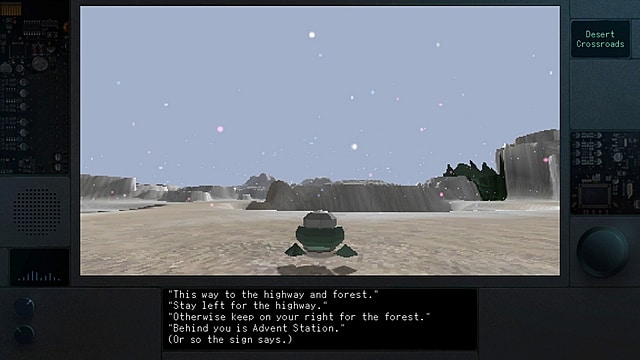

Developer and musician Sean Han Tani describes his game All Our Asias as a lo-fi adventure. This may not appear to be very descriptive at first, but in actuality, it tells us everything we need to know. Is this humble indie game worth playing? Is this unorthodox journey worth taking? Read on to find out.
All Our Asias is a game that tells the story of a man seeking a connection. Yuito, a U.S.-born-and-raised Japanese-American, learns that his estranged father is on life support. With his father's last few days near, Yuito longs to understand him, so he decides to traverse his father's memories virtually via the Memory World. What he takes is a trip into the surreal.

Low Fidelity
Lo-fi (Low Fidelity) is an artistic movement of music where sound quality is lowered or degraded purposefully. This particular crafting of music has been around for decades. The absence of sound is meant to create productions that normally can't be made, so instead of giving us a lot (as per the standard), there's a minimalism at play to convey a different sound.
More recently, "lo-fi" has become an adopted term among other forms of entertainment with the same goal. All Our Asias as a whole encompasses this ideal.
With this in mind, the entirety of the game exists within the Memory World. You have a ship to travel this strange plane of existence, visiting stages that become more different than the last. This world is unconventional but not difficult to traverse.
Controls are bare-bones as well; all you can do is jump and interact, but not much is necessary gameplay-wise. After all, the goal is to help Yuito to locate memories of his father. As you travel, you'll meet the occasional NPC that will point you in the right direction, and you are able to easily progress on through the story and enjoy it fully -- something that's greatly appreciated.

Purposeful Plot
As the game starts, you are introduced to some important questions, one of which asks if you're Asian. The game then proceeds to ask something much more heavy: Are you sympathetic to Asian causes? This and other questions become a running theme throughout the journey.
Eventually, you'll witness memories of Yuito's dad at different points in his life. You realize he had faults and shortcomings like any other human being. This unfolds as Yuito travels to a new area, speaks to some individuals, and is given a serious question or subject to consider -- questions of race, identity, and nationality.
Developer Sean Han Tani, I believe, chose this "going through the motions" approach to convey a sense of normalcy where it's absent. Time in the Memory World runs parallel to his father's life as he pursued the "American Dream," which (I'm sure you can agree) can be very surreal in and of itself. You have difficulties of success, finding personal balance, and, hell, even recognizing whom you are. We get a healthy sample of this through Yuito's bizarre adventure.
With the lo-fi aesthetics in mind, the story is also able to convey feelings of being lonely. The game uses text-only chat, conversations with faceless figures, and empty black space (among other things) to set the tone. When coupled with worlds that are expansive and effectively empty, you get the sense of isolation. Yuito's journey, although important, is quite melancholy.
Do-It-Yourself Music
Lo-fi music can also be synonymous with "do-it-yourself" music. The production entails that this music was created personally, often within a bedroom. Here it's quite literal, as Sean Han Tani scored his own game.
The music and audio of All Our Asias is arguably the most impressive aspect of the experience. As I mentioned before, worlds are really connected, and they are sporadic, really. To that end, the soundtrack helps drive that sense of displacement beautifully.
This displacement can be heard as you travel the white tunnel, an area where echoing, subtle tones almost envelop you. There's literally nothing but you and pulsating chimes within an empty land. Tani's proficiency with tonal changes are also evident as you make your way deeper into the game. One example arrives within a forest in which you'll hear a number of natural sounds accompanied by a somber electronic tune that introduces itself. Other times, you'll be treated to a slow piano melody, ripe with soft sound effects and bass as you visit a supposed ghost town.
Important scenes take place with tunes matching the mood. I don't believe the audio of All Our Asias would be as effective if Sean wasn't his own musician. I can only imagine the time devoted to this endeavor (let alone the game itself). His unique position as developer and musician allows for an intimacy felt on the soundtrack.

Imperfections
As with all indie games, they will be scrutinized, unfortunately. Simply put, All Our Asias' design and execution will turn off some players. The game may be considered too weird. Also, it can only really be appreciated when it's played -- video and images do it no justice. Like the lo-fi aesthetics it invokes, it's an acquired taste that most don't always appreciate for what it is. None of these assumptions mean it's a bad title. It's just a game that isn't for everyone.
Last Loop
When All Our Asias came across my timeline, I was intrigued. It presented itself as a small adventure influenced by a particular design ideal. Sean Han Tani was able to create a game that captures this well. It's a game that represents artistic freedom.
It's this freedom that allows it to intersect a number of genres and thoughts. It's something of a platformer, it's visual novel-like, and it's also very much an adventure game. This intertwining of ideas allows for an overall experience that's profound and which can be enjoyed within a few hours. I strongly believe games like this are important in the video game landscape. They offer a different kind of experience that's enjoyably refreshing. I'd highly recommend it.
If you are a fan of indie games and/or adventure games, All Our Asias is available via Steam and itch.io.
0 comments:
Post a Comment